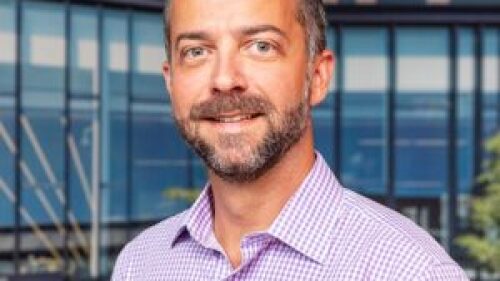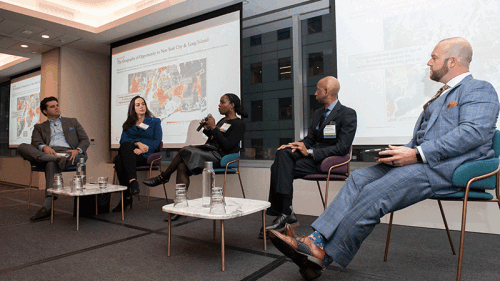ULI Asia Pacific Chairman and Global Trustee Nicholas Brooke is chairman of Hong Kong–based real estate consultancy Professional Property Services Group. His 50-plus-year career in real estate has also seen him juggle a host of roles in both the public sector and the private sector. Apart from an ongoing position as principal adviser to the APEC Business Advisory Council, he has served as chairman of the Hong Kong Harbourfront Commission and Hong Kong Science and Technology Parks, as well as president of the Royal Institution of Chartered Surveyors. Before arriving in Hong Kong some 40 years ago, he worked in the Middle East as an adviser to the ruling families of Dubai, Bahrain, and Abu Dhabi, where he helped set up the Abu Dhabi Investment Authority (ADIA), today one of the world’s biggest sovereign wealth funds.
Senior executives in almost any field tend to follow a fairly well-trodden career path, but your background is less conventional. How did you get to where you are today?
I was actually brought up in Brazil. My father worked there for ICI, so my first 14 years were spent in Sao Paulo, where I went to school and was taught in Portuguese. Then we moved back to Yorkshire in the U.K., and I became heavily involved with the local estate, helping them manage their affairs, so I decided to pursue agriculture. I became a land agent, and the first three to four years of my career I spent managing farms and estates for the crown and church. From there, I moved over to the urban side and started to get involved in development and valuations of urban property.
Soon after that, the company I was working for had this big event and called me down to the head office in London. And as I walked into reception, there stood this gentleman, six feet three inches [1.9 m] tall in a flowing white gown and a beard—obviously an Arab. This was in the late ’60s. It was early days, and Arabs hadn’t been seen in London in any numbers. But as you do when you’re a keen young man, I asked: “Sir, can I help you?” And it turned out he was one of the sons of the ruler of Dubai. It was just at the time the oil money was starting to flow, so in fact he’d been sent off by his father to start spending some of that money. What he really wanted was to buy a house in London. So I helped him buy his house, and after that he just carried on; we bought him hotels, office buildings, and so on.
Now, this was in the days of cash, and of course at the time the Middle East had no track record in the United Kingdom, so no one was going to deal with them unless they were going to do a cash purchase. This meant U.S. dollar cash, literally, in a suitcase—which is how I learned that a large suitcase will carry US$22 million in $100 bills!
After about six weeks, the father heard about what his son was up to. He summoned him back home but said: “By the way, you’d better bring young Brooke with you.” So I headed off to Dubai, where we spent three very happy years working with the ruling family, helping them invest within the Emirate and internationally. Then after a few years, the ruler of Bahrain asked if he could borrow me. So we moved to Bahrain for a year, doing exactly the same thing. Then came Abu Dhabi, where I spent another three years. Of course, that was a fairly serious time—more oil was flowing, and obviously it’s fine having people like me investing [the proceeds], but essentially you needed an institution. So, we were involved in setting up the Abu Dhabi Investment Authority (ADIA), which is now one of the major sovereign players.
And eventually you moved to Hong Kong?
So that takes us through to the late 1970s, when I was approached by the Swire Group to come to Hong Kong. The economy had moved on and most of their waterfront properties—a dry dock at Tai Koo, a sugar refinery, lots of warehouses—had become redundant. They realised, though, that these were potentially very valuable, so part of my role was to develop a master plan for these properties. The big challenge was that we came up with a way to build 63 towers accommodating 50,000 people, but at the same time—and quite rightly—the city was focused on jobs, because there’s no way you can create a community with that number of people without also creating local employment. So, in addition to Tai Koo Shing came the Tai Koo industrial estate, which provided 10,000 or so jobs, and is now where all the new office buildings are being built. And soon after that, the MTR [Mass Transit Railway] came into play. We were looking initially at a self-contained solution, but when these places became connected to Central, it had a major impact. We started selling Tai Koo at HK$150 per foot, but when I left we were selling it at about HK$4,500 to HK$5,000—about 50 times the original price. And now it’s about HK$15,000 to HK$20,000.
Ultimately, you decided to start your own business. What did that involve?
We started with a Hong Kong focus because that was where my experience lay. But the clients we worked for very soon wanted to get involved around the region, or were already involved, so we had to respond to that, and we did it in two ways: first, by forming alliances in different markets, and internationally. One model we used was hub-and-spoke, with alliances and relationships. And the other—because in many of the emerging markets there was just a lack of partners or expertise—we set up our own offices. At one stage, we were around 17 offices and maybe 1,400 to 1,500 people. We found good local partners, but we brought in the expertise, the best practice, and very often we brought the investment.
Who are your clients?
Larger families. Much of our work is for families and always has been. A number of corporates as well, and we also do advisory work for the Hong Kong and other governments. But the investment and very often the development we do are mainly via joint ventures with local families’ private wealth. They are very active around the region and have grown a lot over the last 10 years, partly because they’ve built up more wealth as families, but also because their allocation to real estate has increased. Before, it might have been 5 to 10 per cent. Now, it can be as much as 15, 20, or 25 per cent.
Is there a reason for that?
I think within family portfolios they are always looking for an element of anchor, of certainty, and a refuge. So real estate is seen as ticking all those boxes. And it’s also seen today as more about value conservation rather than value creation. So there’s a very clear drive to preserve wealth as well as create it, and real estate is seen as a means of wealth preservation.
Is it fair to say generally that this type of money is more willing to accept risk than conventional investment funds?
Yes, and of course you’re moving down the generation ladder now, so we’re into the third and fourth generation, looking at people being educated offshore, with a very different perspective on life, people who have worked offshore and returned home wearing very different spectacles.
How has that generational shift affected investment patterns?
I think it’s changed them in a number of ways. First, there is more willingness to consider nontraditional forms of investment, such as the services side of real estate, and on the proptech side, but also there are a number of families now heavily invested in health care, in wellness, the soft side if you like, things like healthy ageing. So looking at how they can add to the value of their real estate through a strong service group, soft provision as well as hard provision. Then I think there’s also a willingness to look at emerging markets and frontier markets. And this is largely through a wish to learn. It’s very interesting. In our ULI research, we’ve talked about funds and about how there’s been a distinct push back in allowing other people to manage assets. In the past, they would have just invested, very traditionally, in two or three markets around the region that were mature. Now, they increasingly want to deal direct, and many of the younger people are investing in this way as a means of learning and understanding markets.
And that fits with your mentality, too?
Yes. Obviously, risk and reward go hand in hand, but this also probably feeds into ULI—it’s an interest in shaping and influencing outcomes. Many of our younger investors have the same attitude. They want to play a part in shaping the outcome of a particular project or initiative and indirectly contributing to the future of that city and country.
You are known in Hong Kong for your longstanding commitment to socially driven work, in general helping sustain the community. How did that start?
Initially when working at Tai Koo Shing, one needed to develop a detailed understanding of the housing market in Hong Kong and its driving forces. And as a result, I was asked to join the Housing Authority and eventually became vice chairman. In those days, the Housing Authority was looking at different housing models and especially at ways to address the challenge of many families who were living in substandard housing, particularly those living in squatter huts on hillsides, and so there was a big issue in terms of rehousing and what the model should be.
The way we looked at it was by dividing the market into those who couldn’t help themselves, which was your public rental, and those who could help themselves if they had some financial assistance.
So that saw the emergence of the Home Ownership Scheme [HOS]—they could get on the ladder if they were given some financial help, which we provided by discounting the price down to 70 per cent of market [rate]. So we came up to these two models and began building units that corresponded to that matrix.
Hong Kong has a pretty acute shortage of housing, and there are lots of proposals for dealing with that. How would you address the situation?
The first thing is that we need to be much more proactive in moving things forward. I think you can hide behind land supply and say we can’t do anything until we have the land. But there are lots of things we can do in the interim. I think where I disagree with current policy is on the proposal to increase the supply of public housing to 70 per cent of the total. I’m an ownership man, and I believe we should anchor Hong Kong through ownership, not through rental. Public rental just increases the burden on society. We have 850,000 public housing units today, and replacing—and just maintaining—those units is a huge burden on society. No one has really thought about that as a long-term challenge. So, I would ring-fence the 850,000 and say that’s it, we’re going to work within that stock, and I’d be very tough on those who need to be moved on because of their personal wealth and all the rest. So, I’d move people out and I’d move new people in, but I would do it within that existing stock of 850,000. For the new stock that we build, a 70/30 split is fine, but I think that 70 per cent should be subsidised purchase and then 30 per cent should be market purchase. Whereas the current model is 70 per cent public rental, which I think is just increasing the burden on society, we’re helping people who don’t really need public rental help. They need the subsidised-purchase help. We should be moving more aggressively to an ownership model. We’re building 50,000 units per year now; I think all that should be private-ownership related.
The other thing is that we need to do this deal with the developers in the New Territories on farmland. My understanding is that they are willing to come to some understanding. Within their mix, they will provide an element of affordable housing, an element of elderly housing, and housing for singles. There’s a way to come up with a very interesting mix of units in the New Territories, which would respond to many of the challenges.
What is stopping that from happening now?
A lack of brave decisions and leadership. Because housing is a public purpose. So you can resume [the land]. Carrie Lam [the chief executive of Hong Kong] has got to wave the stick a bit more seriously and maybe she has to resume the odd site to show she’s serious. The other thing we need to do is to develop a private rental sector in Hong Kong in a structured way. We have this approach in Hong Kong where people expect to buy as soon as they’re out of university or even before. You and I rented for five, 10 years, or longer, and that should be the norm. So the government should sell land subject to restrictions in terms of it being built for rental. And we can have some income bands and we can focus on people who need help. Then the developers can sell that stock as an investment to an institution once it’s built.
Does that create a problem with yields given that rents in Hong Kong are so low relative to the value of the property?
Well, the government needs to price the land in an appropriate manner that would allow an acceptable yield. And to the extent that people need help, you can have a voucher system. The Hong Kong chief executive is a voucher person and believes that you don’t just give a blanket level of assistance to everyone, you do it on a personal wants/needs basis. So, if you need a top-up to pay the rent then you get that, assessed on your income, etc. So different people would get different levels of assistance through vouchers as well. UL
COLIN GALLOWAY is ULI Asia Pacific vice president for content.






